
The chapters, all of which are new to this edition, focus on key features of the political systems that have emerged following the transition to postcommunist rule and the enlargement of the European Union through 2006. Full attention is given to the pattern of events in individual nations, but the main emphasis is on the framework of politics across the region—constitutions, leadership, parliaments, parties, and electoral systems—and the process of politics, as it is revealed in political participation, civil society, economic change, and the quality of democratic government within and beyond the region.
Clearly written and well supported with references and suggestions for further reading, Developments in Central and East European Politics 4 is the ideal guide to the process of change in a group of states that were formerly modeled on the Soviet Union but are now a distinctive and varied presence within a continent that has been redefining its boundaries, its values, its economic systems, and its international allegiances.
Contributors. Judy Batt, Dirk Berg-Schlosser, Sarah Birch, Heather Grabbe, Tim Haughton, Krzysztof Jasiewicz, Petr Kopecký, Paul G. Lewis, Frances Millard, Cas Mudde, D. Mario Nuti, Mark Pittaway, Ray Taras, Stephen White, Andrew Wilson, Kataryna Wolczuk

The chapters, all of which are new to this edition, focus on key features of the political systems that have emerged following the transition to postcommunist rule and the enlargement of the European Union through 2006. Full attention is given to the pattern of events in individual nations, but the main emphasis is on the framework of politics across the region—constitutions, leadership, parliaments, parties, and electoral systems—and the process of politics, as it is revealed in political participation, civil society, economic change, and the quality of democratic government within and beyond the region.
Clearly written and well supported with references and suggestions for further reading, Developments in Central and East European Politics 4 is the ideal guide to the process of change in a group of states that were formerly modeled on the Soviet Union but are now a distinctive and varied presence within a continent that has been redefining its boundaries, its values, its economic systems, and its international allegiances.
Contributors. Judy Batt, Dirk Berg-Schlosser, Sarah Birch, Heather Grabbe, Tim Haughton, Krzysztof Jasiewicz, Petr Kopecký, Paul G. Lewis, Frances Millard, Cas Mudde, D. Mario Nuti, Mark Pittaway, Ray Taras, Stephen White, Andrew Wilson, Kataryna Wolczuk
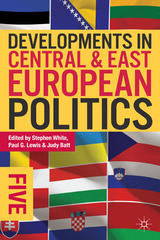
Central and East Europe is a large, extremely diverse region, encompassing full-fledged EU members—the Czech Republic, Hungary, Poland, Estonia, Latvia, Lithuania, Slovenia, and Slovakia, followed later by Bulgaria and Romania—as well as nations of the Western Balkans that are progressing at various speeds along the EU path—Croatia, about to join; Macedonia, Montenegro and Serbia, with EU candidate status; and Albania, Bosnia and Herzegovina, and Kosovo, struggling to keep up. The region also includes the East European states of Ukraine, Belarus, and Moldova. In this collection, leading authorities examine how these heterogeneous nations have fared since the collapse of communism. The contributors look at executive leadership, elections and voter behavior, parliamentary systems, political parties, citizen engagement in civil society, the effects of neoliberalism, and the quality of life in postcommunist democracies. Most of the essays are new to this edition; the rest have been thoroughly updated.
Contributors. Judy Batt, Sarah Birch, Nathaniel Copsey, Terry Cox, Rick Fawn, Tim Haughton, Krzysztof Jasiewicz, Paul G. Lewis, Frances Millard, David M. Olson, Mitchell A. Orenstein, Andrew Roberts, Ray Taras, Stephen White, Andrew Wilson
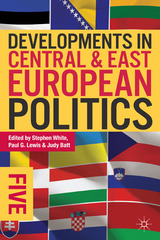
Central and East Europe is a large, extremely diverse region, encompassing full-fledged EU members—the Czech Republic, Hungary, Poland, Estonia, Latvia, Lithuania, Slovenia, and Slovakia, followed later by Bulgaria and Romania—as well as nations of the Western Balkans that are progressing at various speeds along the EU path—Croatia, about to join; Macedonia, Montenegro and Serbia, with EU candidate status; and Albania, Bosnia and Herzegovina, and Kosovo, struggling to keep up. The region also includes the East European states of Ukraine, Belarus, and Moldova. In this collection, leading authorities examine how these heterogeneous nations have fared since the collapse of communism. The contributors look at executive leadership, elections and voter behavior, parliamentary systems, political parties, citizen engagement in civil society, the effects of neoliberalism, and the quality of life in postcommunist democracies. Most of the essays are new to this edition; the rest have been thoroughly updated.
Contributors. Judy Batt, Sarah Birch, Nathaniel Copsey, Terry Cox, Rick Fawn, Tim Haughton, Krzysztof Jasiewicz, Paul G. Lewis, Frances Millard, David M. Olson, Mitchell A. Orenstein, Andrew Roberts, Ray Taras, Stephen White, Andrew Wilson

Contributors. Alfred B. Evans, Zvi Gitelman, Gordon Hahn, Margot Light, Michael McFaul, Sarah Oates, Thomas F. Remington, Peter Rutland, Richard Sakwa, Robert Sharlet, Darrell Slider, Judy Twigg, Stephen White, John P. Willerton

Contributors. Alfred B. Evans, Zvi Gitelman, Gordon Hahn, Margot Light, Michael McFaul, Sarah Oates, Thomas F. Remington, Peter Rutland, Richard Sakwa, Robert Sharlet, Darrell Slider, Judy Twigg, Stephen White, John P. Willerton

Contributors. Alfred B. Evans, Henry E. Hale, P. Hanson, Margot Light, N. Manning, J. Mathers, Michael McFaul, Sarah Oates, Thomas F. Remington, C. Ross, Richard Sakwa, Darrell Slider, G. Smith, Stephen White, John P. Willerton
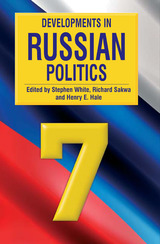
Contributors. Alfred B. Evans, Henry E. Hale, P. Hanson, Margot Light, N. Manning, J. Mathers, Michael McFaul, Sarah Oates, Thomas F. Remington, C. Ross, Richard Sakwa, Darrell Slider, G. Smith, Stephen White, John P. Willerton
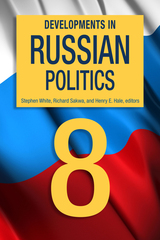
Contributors. Vladimir Gel'man, Henry E. Hale, Philip Hanson, Kathryn Hendley, Margot Light, Jennifer Mathers, Ian McAllister, Sarah Oates, Thomas F. Remington, Graeme Robertson, Richard Sakwa, Darrell Slider, Svetlana Stephenson, Stephen White, John P. Willerton
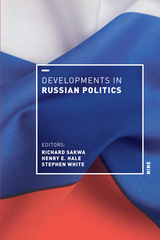
Contributors. Samuel Charap, Valentina Feklyunina, Henry E. Hale, Philip Hanson, Kathryn Hendley, Marlene Laruelle, Ellen Mickiewicz, Ben Noble, Thomas F. Remington, Bettina Renz, Ora John Reuter, Graeme Robertson, Richard Sakwa, Darrell Slider, Stephen White, John P. Willerton
READERS
Browse our collection.
PUBLISHERS
See BiblioVault's publisher services.
STUDENT SERVICES
Files for college accessibility offices.
UChicago Accessibility Resources
home | accessibility | search | about | contact us
BiblioVault ® 2001 - 2025
The University of Chicago Press









